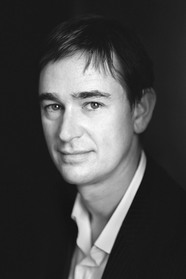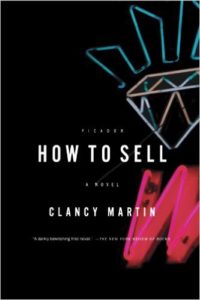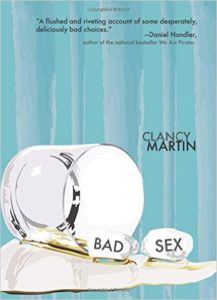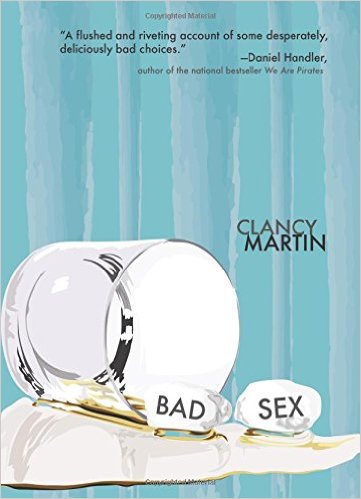Every month, I interview an author I admire on his literary firsts.
 January’s featured author is Clancy Martin, author of two novels including How to Sell, a fast-paced, entertaining tale of deception — both of others and of the self — peppered with philosophical ideas that’ll make you think about life and desire and ambition.
January’s featured author is Clancy Martin, author of two novels including How to Sell, a fast-paced, entertaining tale of deception — both of others and of the self — peppered with philosophical ideas that’ll make you think about life and desire and ambition.
Clancy more recently wrote a novel called Bad Sex — also a fantastic read (an excerpt is in Vice). As a professor of philosophy, he’s also authored a number of philosophical books. Unrelatedly, he’s been to jail seven times, once for rolling through a stop sign!
In this interview, Clancy talks about how he turned memoir into fiction, how his writing changed after getting sober, and what books of philosophy he recommends for aspiring novelists.
Sign up with your email below to be entered to win a copy of How to Sell — and to get notified of future interviews!
____
 Siel: One of the things I love most about How to Sell is the deadpan, flat feel of the dialogue. It’s so unique — How did you arrive at this tone? Are there other books and authors that informed or influenced your voice in this book?
Siel: One of the things I love most about How to Sell is the deadpan, flat feel of the dialogue. It’s so unique — How did you arrive at this tone? Are there other books and authors that informed or influenced your voice in this book?
The tone was certainly influenced, I hope, by my attempt to write like some of my heroes at the time: Camus, Carver, Dostoevsky, Renata Adler. I love clean, unembellished prose. It started out much more flowery, and then I cut, cut, cut it down, with the help of Diane Williams and some other friends.
At a reading at Book Soup, you mentioned that you initially wrote Bad Sex as a memoir — then decided to fictionalize it, changing the protagonist from a man to a woman. Considering that the book is about an extramarital affair — Did the rewriting process bring you any interesting revelations about the similarities or differences between men and women’s psychologies and desires?
I think I may have learned, through reflecting for a long time on the psychology of one of the heroes in that book (Edouard), that a love relationship that is built on a lot of lying probably includes lying going on in both directions. That is, Brett, my female hero, thinks she tells all the lies and Edouard really doesn’t lie to her nearly as much—and for a long time, writing and rewriting the book, I had the same view of Edouard. But then I realized that no, he was lying just as much as she was, but she really needed to believe his lies. Brett is one of those very honest liars. She believes in the importance of truth and knows she’s betraying it and herself. Edouard doesn’t care about truth. It’s at best an instrumental good for him.
 In addition to a lot of sex, there’s a lot of drinking in Bad Sex. I think, though, that you wrote this book after quitting drinking yourself. I’m guessing that going alcohol-free probably changed your day-to-day lifestyle — but I’m wondering, has it changed your writing? Do you see a stylistic difference between your pre and post sobriety writing?
In addition to a lot of sex, there’s a lot of drinking in Bad Sex. I think, though, that you wrote this book after quitting drinking yourself. I’m guessing that going alcohol-free probably changed your day-to-day lifestyle — but I’m wondering, has it changed your writing? Do you see a stylistic difference between your pre and post sobriety writing?
I do, yes: it is much harder for me to write now that I don’t drink. I didn’t write while drinking—well, I did, but none of it was ever any good. But there was something about a hangover that made me very fluent and creative, in the old fashioned sense of the word creative, inspired I suppose. Now, sober, I have to work harder. Writing is harder when I’m sober; but life, I’m grateful to say, is a bit easier.
On top of writing great novels, you also teach philosophy — and write books of essays (Love and Lies: An Essay on Truthfulness, Deceit, and the Growth and Care of Erotic Love) and edit anthologies (The Philosophy of Deception) in that capacity. The topics of those nonfiction books, though, seem related to the themes you explore in your novels. How would you say the two inform each other?
For me, good writing always addresses philosophical worries. So if I’m struggling with some philosophical problem—like deception, in the past, or love, or more recently the role of emotion in everyday life, and the notion of duty—it naturally comes through in my fiction. I don’t think you “solve” philosophical problems in fiction, but then I’m not sure one can solve most philosophical problems in the rational way that we hope to solve them. Fiction is very good at exploring the nuances of many philosophical problems. Everything is more complicated than it appears. Fiction is good at showing that.
What work of philosophy would you most recommend to an aspiring fiction writer?
What an interesting question. It would very much depend on the writer, I think. For me, when I hadn’t published much or anything yet, Kierkegaard and Nietzsche were very helpful, as was Kant’s Prolegomena To Any Future Metaphysics, as were the essays of Camus and De Beauvoir’s The Second Sex. But if you have to pick one book of philosophy that really might help, I think Fear and Trembling by Soren Kierkegaard. Also, more importantly, read Basho’s . I also think Renata Adler’s work can’t be recommended enough, and if you want a great book of short stories about serious Buddhist philosophy, read Amie Barrodale’s (2016) You Are Having a Good Time (full disclosure: I am married to Amie).
___
Purchase a copy of How to Sell now, or enter to win one by signing up for the newsletter. Already joined up? Then you’re already entered!

